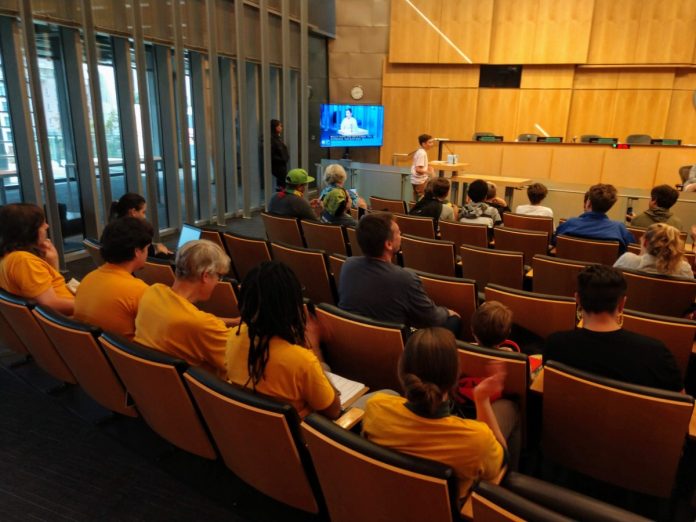
The Seattle budget process is chugging along with another public comment session tomorrow Wednesday at 3:30pm. Soon Seattle City Council will be making their final tweaks to the Mayor’s budget. Now is the time to comment or testify at City Hall.
The six-billion-dollar budget is a daunting document so we at The Urbanist have some recommendations to make it easier to make an impactful comment.
Pass the MASS Transportation Package.
Seattle Neighborhoods Greenways has a handy form to submit comments backing the Move All Seattle Sustainably (MASS) coalition’s package of walking, rolling, biking, and transit infrastructure improvements. Some MASS resolutions have already passed, while others still need your help. Priorities include the Georgetown to South Park Trail, the Beacon Avenue trail, a safe crossing for the Duwamish Longhouse, doubling the amount of bus lanes, a people-first traffic signal policy, and finding a long-term source of revenue for sidewalk repairs and expansions.
Pass Councilmember Teresa Mosqueda’s proviso obligating the City to reassess its urban village growth strategy.
Seattle Tech 4 Housing has made a handy form to comment. The budget action would set aside $500,000 for an environmental impact statement (EIS) focusing on the racial equity implications of our current approach and how we could alleviate them via strategies to minimize displacement of low-income residents and communities of color.
“The EIS study would be initiated in 2020 and would explore additional housing capacity and diversity—including duplexes, triplexes, fourplexes, and row homes—in areas currently zoned exclusively for single-family houses.” These “missing middle” housing types are very difficult to build in Seattle exacerbating our housing crisis and blocking mixed-income neighborhoods from forming. The Seattle Planning Commission estimates 75% of Seattle’s residential land is reserved for single-family homes–the most expensive housing type. Single-family homes have a median sale price of $715,000 in Seattle right now.

Although the City must laboriously study and defend every zoning change, the City doesn’t ever have to defend the status quo in which wealthy, predominantly White neighborhoods like Magnolia, Madison Park, Madrona, Montlake, Laurelhurst, Broadmoor, and Wedgwood that have manipulated the system to avoid urban village status. Passing this proviso would be an important first step toward rectifying Seattle’s uneven growth and decreasing displacement.
Fare Share Plan: protect drivers, fund transit and housing, raise the ridehailing fee.
The Fare Share Coalition has a handy petition you can use. The Fare Share Plan represents a new source of progressive revenue in the budget via its 51-cent bump to the ridehailing fee. Over the first five years, the Mayor expects to fund 500 new affordable homes and close the Center City streetcar budget shortfall. After funding the streetcar, the transportation funding would switch to bus, bike, and pedestrian projects under the Mayor’s proposal.
A new Driver Resolution Center would arbitrate disputes when drivers or ridehailers get kicked off the app. The plan also would initiate a wage study to gauge how to guarantee drivers a living wage. Urge the City to guarantee ridehailing drivers earn at least the minimum wage after expenses. Ridehailing giants Uber and Lyft are sabre-rattling about mobilizing their user base against the Fare Share Plan, so please voice your support to see this through. (You can ask the City to advance the congestion pricing process, too, for bonus points–we can do both!) The Fare Share Plan will be discussed Thursday at City Hall with public comment at 3pm. Follow online with #FareShare.
Support amendment to direct more Mercer Megablock revenue to low-income housing.
The Mayor’s Mercer Megablock proposal pushed her priority for middle-income housing. Councilmembers Mosqueda and M. Lorena González would rather prioritize low-income housing, and we agree. The need is more acute for low-income housing; many people are being priced out of Seattle. More middle-income housing would be nice, but it’s a lower budget priority. Councilmember González had asked the City to do a racial equity analysis on the $6 million program that Mayor proposed to help homeowners finance backyard cottage construction, but that hasn’t happened, providing another reason to shift the money to low-income housing.
For this and any of other budget actions, crafting your own unique email to councilmembers or calling them can also be very effective. Here is contact information for the nine councilmembers:
- Lisa Herbold (D1) lisa.herbold@seattle.gov or 206-684-8803
- Bruce Harrell (D2) bruce.harrell@seattle.gov or 206-684-8804
- Kshama Sawant (D3) kshama.sawant@seattle.gov or 206-684-8016
- Abel Pacheco (D4) abel.pacheco@seattle.gov or 206-684-8808
- Debora Juarez (D5) debora.juarez@seattle.gov or 206-684-8805
- Mike O’Brien (D6) mike.obrien@seattle.gov or 206-684-8800
- Sally Bagshaw (D7) sally.bagshaw@seattle.gov or
206-684-8801 - Teresa Mosqueda (P8) teresa.mosqueda@seattle.gov or 206-684-8806
- M. Lorena González (P9) lorena.gonzalez@seattle.gov or 206-684-8802
This article has been updated to reflect the budget comment session was delayed from its original date of Tuesday October 29th to Wednesday October 30th.
Doug Trumm is publisher of The Urbanist. An Urbanist writer since 2015, he dreams of pedestrian streets, bus lanes, and a mass-timber building spree to end our housing crisis. He graduated from the Evans School of Public Policy and Governance at the University of Washington in 2019. He lives in Seattle's Fremont neighborhood and loves to explore the city by foot and by bike.


